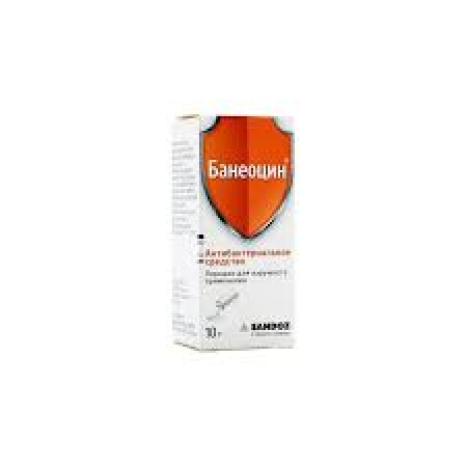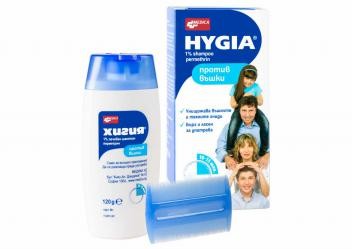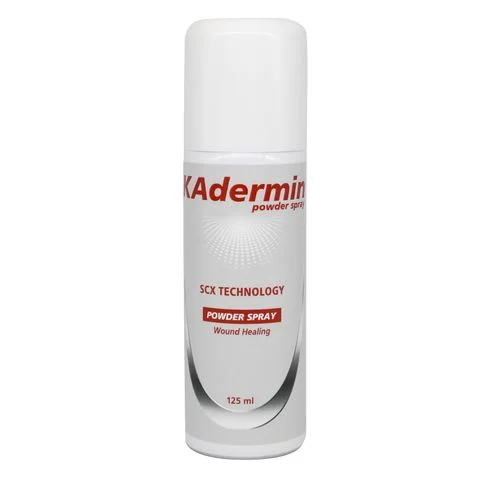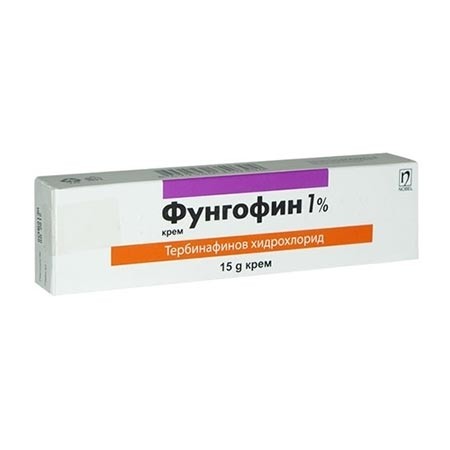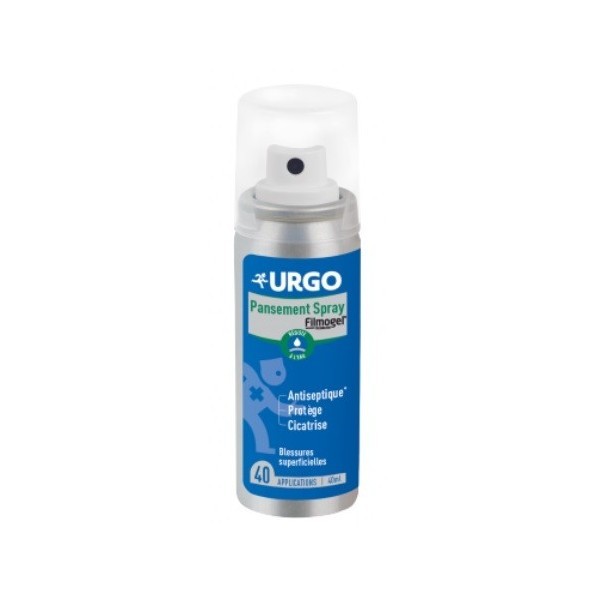BANEOCIN powder 10g
BANEOCIN powder 10 g.
Leaflet: user information
Baneocin 250 IU / 5,000 IU / g powder for skin
Baneocin 250 IU / 5,000 IU / g cutaneous powder
bacitracin zinc/ neomycin sulfate
bacitracin zinc/neomycin sulfate
Read all of this leaflet carefully before you start using this medicine because it contains important information for you.
Always use this medicine exactly as described in this leaflet or as your doctor or pharmacist has told you.
Keep this leaflet. You may need to read it again.
If you need further information or advice, ask your pharmacist.
If you get any side effects, tell your doctor or pharmacist. This also includes any possible side effects not described in this leaflet. See point 4.
If after seven days you do not feel better or your condition worsens, you should seek medical attention.
What this leaflet contains
1. What Baneocin skin powder is and what it is used for
2. What you need to know before you take Baneocin powder for skin
3. How to take Baneocin skin powder
4. Possible side effects for skin
5. How to store Baneocin skin powder
6. Contents of the package and additional information
1. What Baneocin skin powder is and what it is used for
Baneocin skin powder is a combination of two antibiotics intended for external use only. It contains two substances that are powerful when applied topically and have an antibacterial (killing germs) effect: bacitracin and neomycin.
Both antibiotics are effective against many different microorganisms that cause disease. Their spectrum of action complements each other and partially increases the overall effect.
They are generally well tolerated and their effectiveness is not reduced by secreting wounds, pus, blood or tissue components. Therefore, Baneocin Skin Powder can be used topically on the skin, mucous membranes and wounds, etc.
Baneocin skin powder supports the natural breathing of the skin, thus providing a soothing and cooling effect.
Baneocin skin powder is effective against infections caused by microorganisms that are sensitive to neomycin and/or bacitracin:
small bacterial skin infections such as:
Bacterial infected herpes simplex (Herpes simplex blisters), herpes zoster (Herpes zoster) and chicken pox, wet impetigo (impetigo contagiosa), infected lower limb ulcers (ulcus cruris), infected skin rashes (eczema), bacterially infected rashes caused by diapers (diaper dermatitis).
prevention of umbilical cord infection in newborns
after surgery
Baneocin skin powder can be used as an adjunctive therapy in post-operative treatment, for example:
tissue removal (cutting, burning);
painful tears in the skin (fissures);
tearing of the perineum;
perineal incision (episiotomy);
wet wounds and scars.
2. What you need to know before using Baneocin powder for skin
Do not use Baneocin powder:
if you are allergic to bacitracin and/or neomycin, or other aminoglycoside antibiotics, or to any of the other ingredients of this medicine (listed in section 6);
you should avoid using Baneocin powder for the skin on serious skin injuries over a large area, because if it gets into the blood stream it can cause side effects affecting hearing, including loss;
in the case of severe heart or kidney disorders affecting excretory function and existing damage to the inner ear and/or the organ in the ear controlling balance, Baneocin powder for skin should not be used if there is a possibility of its uncontrolled entry into the bloodstream;
Do not apply the medicine in the external ear canal if the eardrum is damaged;
Do not apply Baneocin powder to the skin around the eyes.
Warnings and precautions
Talk to your doctor or pharmacist before using Baneocin powder.
Tell your doctor at the first sign of side effects.
Tell your doctor if you become pregnant.
Your doctor will decide how Baneocin skin powder should be used in the treatment of cold sores.
When administered in doses significantly higher than recommended - in particular in the treatment of slow-healing ulcers - dissolved active substances can enter the bloodstream. Monitor for any symptoms that may indicate impaired kidney function (lack of appetite, excessive thirst, decreased urine output, traces of blood in the urine) or hearing (inability to hear high-pitched sounds, noise, buzzing or ear pressure). The risk is higher in people with impaired liver and/or kidney function. Therefore, it is recommended that such patients undergo urine, blood and/or hearing tests before and during intensive care.
After frequent or long-term use of Baneocin powder for the skin, there may be a risk of developing muscle weakness. If you already suffer from one (eg myasthenia gravis or a similar disorder), your condition may worsen.
Prolonged use of antibiotics may favor the growth of resistant microorganisms.
Baneocin skin powder should not get into the mouth, especially in children.
Watch for signs of inflammation (warmth, redness, swelling, pain) or fungal infection at the treatment sites. Tell your doctor about these or any other unusual changes.
Other medicines and Baneocin skin powder
Inform your doctor or pharmacist if you are taking / using, have recently taken / used or may take / use other medicines.
If the active substances of Baneocin skin powder enter the body after application to large open wounds, they may increase the nephrotoxic (kidney-damaging) effects of other medicines (eg cephalosporins or other aminoglycoside antibiotics).
If you take diuretics (medicines to increase the volume of urine) such as ethacrynic acid or furosemide, they may increase the harmful effects on hearing and kidneys.
Existing muscle weakness can be aggravated by the use of anesthetics during surgery. If you have a muscle disorder, you must report this before surgery.
Pregnancy and breastfeeding
If you are pregnant or breast-feeding, think you may be pregnant or are planning to become pregnant, ask your doctor or pharmacist for advice before using this medicine.
When the drug is applied to open wounds or similar injuries with a large area, it is possible that the active substances act not only on the site of inflammation; they can also enter the mother's body (in her systemic circulation). In such a case, Baneocin skin powder should be used only under strict medical supervision.
For minor infections and short-term treatment with low doses, there is generally no risk if the drug is used during pregnancy and breastfeeding.
Driving and using machines
Baneocin powder for skin does not affect the ability to drive and operate machinery.
3. How to use Baneocin powder for skin
Always use this medicine exactly as described in this leaflet or as your doctor or pharmacist has told you. If you are not sure, ask your doctor or pharmacist.
Always follow the dosage unless otherwise directed.
In adults and children, Baneocin skin powder is usually applied 2-4 times a day.
The drug should be applied to no more than 1% of the body surface area (about the size of the palm of the hand).
Application method
For application on the skin.
Apply a thin layer of the powder to the affected area and apply a bandage if necessary.
Treatment should last a maximum of 7 days.
If you have used more than the required dose of Baneocin skin powder
If you have used significantly more than the recommended dose, watch for a toxic change in kidney function and/or hearing due to possible absorption of the active substances. See section "Warnings and precautions".
If you forget to use Baneocin skin powder
Do not use a double dose to make up for a missed dose.
If you have stopped using Baneocin powder
Even if your symptoms decrease or disappear completely, you must use Baneocin skin powder for the full treatment period so that all germs can be destroyed and the infection can be prevented from returning.
If you have any further questions related to the use of this medicine, ask your doctor or pharmacist.
4. Possible side effects
Like all medicines, this medicine can cause side effects, although not everybody gets them.
Very common (may affect more than 1 in 10 patients treated);
Common (may affect up to 1 in 10 treated patients);
Uncommon (may affect up to 1 in 100 patients treated);
Rare (may affect up to 1 in 1,000 patients treated);
Very rare (may affect up to 1 in 10,000 patients treated);
Not known (frequency cannot be estimated from the available data).
Rare side effects (may affect up to 1 in 1,000 patients treated):
In 50% of cases of allergies to neomycin, cross-allergy to other aminoglycoside antibiotics is observed.
Allergies occur mainly in the form of a skin rash (contact eczema).
Not known (frequency cannot be estimated from the available data):
Sensitivity: Compared to healthy skin, sensitivity to many different substances, including neomycin (the active substance in this drug), is generally increased as a result of use in the treatment of chronic skin problems. In certain circumstances, the allergy may manifest itself as a lack of response to treatment.
During prolonged use, allergic reactions of hypersensitivity may occur, such as a skin rash accompanied by redness, swelling, dryness or peeling of the skin, as well as itching. If the lesions spread or treatment fails, it may be related to allergy. Therefore, at the first signs of a skin rash you should inform your doctor so that he/she can assess whether the treatment should be continued. If an allergy is found, you should tell your doctor before using other aminoglycoside antibiotics.
With repeated use of the drug on open wounds of a large area, the active substances penetrating the body can cause a disturbance of balance, muscle weakness, hearing problems and kidney damage.
Reporting adverse reactions
If you get any side effects, tell your doctor, pharmacist or nurse. This includes all possible reactions not described in this leaflet. You can also report side effects directly through the national reporting system to:
The Medicines Executive Agency,
Damyan Gruev St. No. 8,
1303 Sofia,
phone: +35928903417,
website: www.bda.bg.
By reporting side effects, you can contribute to getting more information about the safety of this medicine.
5. How to store Baneocin skin powder
To be stored below 25°C.
To be stored in the original packaging.
Keep out of the reach of children.
Do not use this medicine after the expiry date which is stated on the label and carton after EXP. The expiration date corresponds to the last day of the specified month.
Do not dispose of medicines down the drain or in the household waste container. Ask your pharmacist how to dispose of medicines you no longer use. These measures will help protect the environment.
6. Contents of the package and additional information
What Baneocin powder contains:
The active substances are: bacitracin zinc and neomycin sulfate. 1 gram contains 250 IU bacitracin zinc and 5,000 IU neomycin as sulfate.
The other ingredients are: powder base: corn starch - over 98%, magnesium oxide - up to 2%.
What Baneocin skin powder looks like and what the package contains
White to pale yellow powder.
PE pack of 60 g and 10 g, with snap cap.
Not all types of packaging can be put on sale.
Marketing Authorization Holder and Manufacturer:
Sandoz GmbH, Austria.


